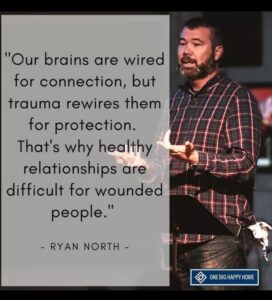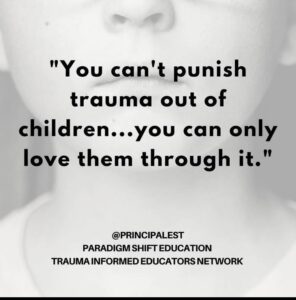#1.) My child’s trauma reflects my parenting.
Your child’s trauma is not your fault, but now it is your chance to help them heal. Getting trained on how to approach a child’s behaviors that stem from trauma makes a world of difference.
#2.) My child doesn’t have trauma since there are no behaviors I am noticing.
Although you may not see surface behaviors that look like trauma, it is always good to look out for signs and symptoms. And if your child is given the opportunity to talk about their experiences, the trauma you hadn’t noticed may present itself. It is always good to keep your finger on the pulse of how your child is doing internally.
#3.) My child benefits from time outs when they misbehave.
When a child with trauma is alone, they can regress to other times they experienced the trauma. As they are alone with their thoughts, they won’t have a way to process them. Having some alone time is not inherently bad, quite the contrary, but as a punishment it is not as effective.
#4.) My child is not grateful for my love and care when they talk so fondly  about their neglectful and/or abusive birth parent(s).
about their neglectful and/or abusive birth parent(s).
It is hard to imagine, but if you will, the only family you knew was not allowed to care for you anymore. Children of all ages who are removed from their birth homes may not truly understand the reasons why it happened. The birth parent most likely did not want the child removed, so a bond is literally broken, dysfunctional or not. This is not the same as ungratefulness and is not an attack on you. They literally do not know how to behave appreciatively as what happened TO them was NOT a choice. It can be hard emotionally as a parent, but it will help the child cope more effectively if you stay as supportive of the child’s responses as possible. It could help to get support on how to deal with the natural feelings you have that have triggered your response.
#5.) I have parented my birth children successfully. I can just apply those methods I used to my foster/adoptive child.
Unfortunately, the same techniques do not work as well with a child who has been removed from a birth parent. This removal is its own trauma and studies have shown that the standard parenting techniques are not as effective for the child as trauma-informed techniques.
#6.) I had no significant trauma in my life so I can’t be triggered by my child’s trauma reactions.
Your child has been through experiences that many adults have not had to go through. This does not mean that your lack of experiencing trauma cannot trigger you. We, as a community, have been affected by the trauma from Covid, at the very least, as well as other global and personal issues. Anything that your child does that puts you at unease may be worth observing “why” in yourself.
#7.) My child cannot remember their trauma–especially when they were in in utero.
Children may not remember early trauma or may have blocked it out of their memories. Studies have shown, however, that prenatal stress and other more acute factors (drug use, alcohol use, violence, severe mental health issues) can influence the child in utero. Brains form differently and chemicals are secreted in different ways than an uncomplicated pregnancy. So even if they say they don’t remember, the brain does, and so does the body.
Bryna Sherr, ACSW, LCSW, Permanency Coordinator, JFS Adoption & Foster Care






